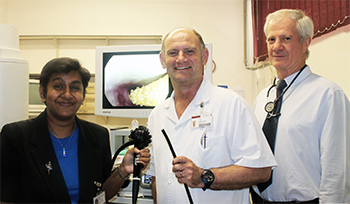Latest News Archive
Please select Category, Year, and then Month to display items
01 June 2023
|
Story Nicole Bongo
|
Photo Supplied
 University of the Free State students participating in one of the many projects coordinated by the Engaged Scholarship Office.
University of the Free State students participating in one of the many projects coordinated by the Engaged Scholarship Office.
To help make a change and push for sustainable development, the University of the Free State Division of Student Affairs works with communities around Bloemfontein fostering a culture of creating sustainable solutions.
Gernus Terblanche, Kovsie Support Services and Assistant Researcher in the Division says, ‘it is important for the university to be actively involved in the community as it makes up such a large portion of the Bloemfontein and students also
represent many different communities on and off- campus.’
Terblanche said: “As an educational institution it is vital for the UFS to support and guide students towards creating innovative solutions; both local and globally. Our experience is that students often come up with real solutions that can
make a real impact in the lives of real people – and it would be crucial to support such initiatives.”
The office has worked with BloemShelter, VermiVillage, GAP Equip, National Hospital and as part of the programmes of 2022 also with Lighuis, Talita Cumi, ROC Kids and the Universitas Neighborhood association. “We are also very fortunate to have,
Shanen Emam, Miss Free State 2023 as one of our students that are involved with our programmes,” added Terblanche.
One of the students involved is Prince Sijane, Bloemfontein Campus Student Representative Council member responsible for Civic and Social Responsibility when asked why student participation is important, he said, “By actively participating in
initiatives that address social issues or promote community well-being, students become more aware of the challenges faced by society.”
Tereblanche said: “The produce of these gardens addresses hunger and malnutrition amongst students on campus. KovsieACT also facilitates an eco-vehicle project during which student teams learn how to build electric vehicles powered by solar charging
stations. This project is aimed at developing skills appropriate to the 4th Industrial Revolution and sustainable resources development including clean and green energy.”
Gastroenterology Unit works to bring a transformative impact to healthcare
2016-11-21

Dr Rita Nathan, Acting CEO of Universitas Hospital,
Prof Willem Kruger, Acting Head of the
School of Medicine, and Prof Jan van Zyl,
Head of Department of Internal Medicine.
Photo: Nonsindiso Qwabe
The departments of Surgery and Internal Medicine at the University of Free State launched the newly upgraded Gastroenterology Unit of the Universitas Academic Hospital on 8 November 2016. Realising the need to provide state-of-the-art equipment that caters for various health needs, the unit has acquired new pieces of equipment worth R7 million. Through the equipment, a move towards the digital revolution, the unit hopes to bring about a transformative impact on healthcare service delivery in central South Africa and its surrounds.
Upgraded unit will make a difference on burden of diseases
Dr Rita Nathan, Acting CEO of the Universitas Hospital, said the increase in the number of scopes, and the improvement in technology, will facilitate improved service delivery to the community of the Free State and beyond. “This upgrade will enable the unit to make a tremendous dent in the burden of diseases in the communities we serve.”
Unit a unique feature in central South Africa
Serving a population from the Free State, Northern Cape, Eastern Cape and Lesotho; the growing demand of health services has led to an increase in the number of patients treated by the unit. This unit is unique in central South Africa as the only one providing endoscopic intervention for cases like gastrointestinal bleeding. It is also the only 24-hour gastroscopic service available in the state sector.
Improved service delivery linked to enhanced training platforms
Prof Willem Kruger, acting head of the School of Medicine, said that the upgrading of equipment will have an immense impact on not only service delivery, but also on training platforms in the latest technologies. “It important, as a university, that our doctors have the latest technology at their disposal to facilitate training. If training improves, service delivery improves. The two on inextricably linked.” he said.